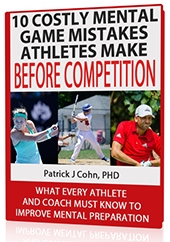Do You Worry About What Others Think?
Validation is something sought after by all athletes, no matter the sport.
Every athlete tries to prove their worth whether it is:
- To impress your coach
- Break into the starting lineup
- Show your teammates that you belong on the team
- Demonstrate to your team that you can contribute to the success of the team
You want that affirmation from others around you that you are a good at your sport.
You want to be recognized for your skills. You want prove that coach was right for selecting you for the team…
You want to prove you belong on the team… You want to show everyone that you deserve that varsity jacket…
You want to be validated and gain a sense of worth as an athlete.
WOW… that’s a lot of pressure!
And Why does this Search for Validation Create Pressure for Many Athletes?
The answer is that these types of validation are attempts to gain recognition from sources outside of you:
- Your coaches
- Your teammates
- Your opponents
- Your parents
- Your friends
- The press, etc.
The problem lies in that you cannot control what others think about you. Other people’s opinions could be biased. And you should not focus on what you think others think of you.
So, trying to gain approval or validation from those outside sources is a distraction and a source of pressure.
Trying to Get Something Outside your Control Creates Tension and Anxiety
Nonetheless, when some athletes don’t get that validation, they over-try or press when they compete, which causes performance levels to drop off significantly.
Professional athletes also fall into the “validation trap.”
For example, Gary Sanchez, catcher for the New York Yankees, is considered by many to be the future of the franchise.
In the 2016 season, Sanchez played 53 games, hit 20 home runs, batted .299 and was the runner-up in American League Rookie of the Year voting.
Fast forward to 2018, Sanchez has only hit 16 home runs, has a batting average of .180 and has allowed 13 passed balls in 85 games.
What is the difference between his level of play in those two seasons?
The Answer is his Mental Approach to the Game
This season, Sanchez is trying to prove that he belongs in the starting lineup, causing him to try too hard to crush the ball and press at the plate.
In 2016, Sanchez did not worry about results, things outside of his control or validation from others.
Sanchez merely focused on the things that brought him success throughout his years of playing ball.
SANCHEZ: “When I first got called up, I went oh-fer my first couple of games. I was feeling anxious because I wanted to get my first hit. And [then-manager Joe] Girardi came up to me and said, ‘Gary, take it easy. You’re going to be in the lineup every day. Just go out there and do what you would do in the minor leagues.’ That was the moment where I just felt the confidence to go out there and take some pressure off my shoulders and do what I needed to do.”
Instead of trying to impress or prove you belong, be selfish with your focus and take care of the task in front of you.
Focus on improving your game and stay focused on that process.
The only person you need to validate yourself is YOU!
Self-respect is stronger than other-respect.
How to Avoid the Validation Trap:
Play for yourself, not to make others happy or earn respect.
Think about the reasons you started your sport. What do you love about your sport?
While you may hear the opinions of others, you do not have to accept them as fact nor do you need to take on those opinions as your own.
Let go of mind reading into what others might think about your game. It doesn’t help you perform in competition.
Related Sports Psychology Articles:
- What’s the Best Program for My Young Athlete?
- How to Perform in Clutch Game-Time Moments
- Helping Kids Experience The Benefits of Youth Sports
Free Mental Toughness Reports

Get instant access to a mental game report to improve your mental toughness. Are you making one or more of these “deadly” mental game mistakes prior to competition? You can improve your mental game with one of our free sports-specific reports below.
with our free mental toughness reports, you’ll:
- Discover if you have positive or negative pregame jitters.
- Identify your pre-competition mental game mistakes.
- Learn the important pregame mental skills to boost your performance and success!
Learn how mental game strategies can boost your mental toughness in sports with Dr. Cohn’s free mental game reports!

